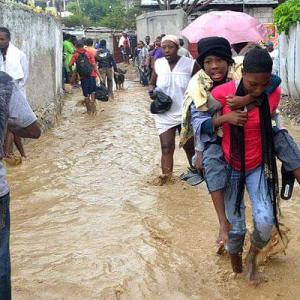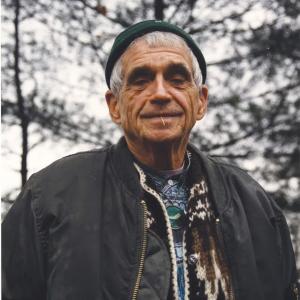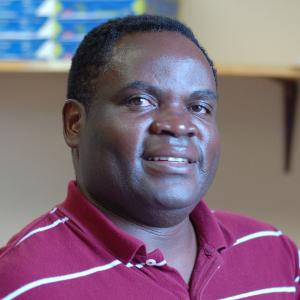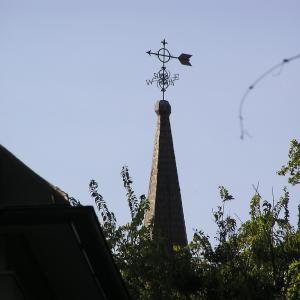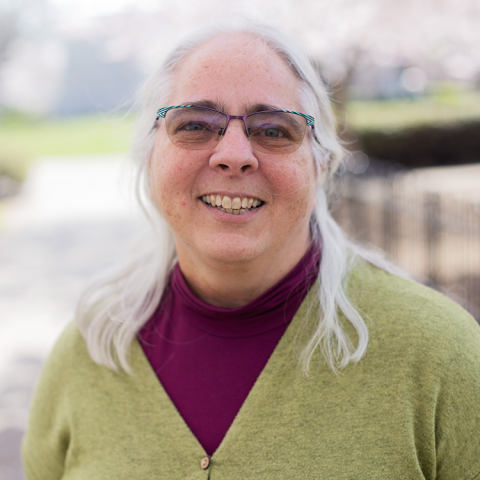
Rose Marie Berger is a Catholic peace activist and poet. She has been on Sojourners staff since 1986, and worked for social justice movements for 40 years. Rose has rooted herself with Sojourners magazine and ministry. She has written hundreds of articles for Sojourners and other publications and is a sought after preacher and public speaker. After living in Washington, D.C., for 35 years, she moved to Oak View, Calif., in 2022.
Rose’s work in Christian nonviolence has taken her to conflict zones around the world. She is active in the Catholic Nonviolence Initiative, a project of Pax Christi International, and served as co-editor for Advancing Nonviolence and Just Peace in the Church and the World, the fruit of a multiyear, global, participatory process to deepen Catholic understanding of and commitment to Gospel nonviolence. Her poetry has appeared in the books Watershed Discipleship: Reinhabiting a Bioregional Faith and Practice and Buffalo Shout, Salmon Cry: Conversations on Creation, Land Justice, and Life Together. She is author of Bending the Arch: Poems (2019), Drawn By God: A History of the Society of Catholic Medical Missionaries from 1967 to 1991 (with Janet Gottschalk, 2012), and Who Killed Donte Manning? The Story of an American Neighborhood. She has also been a religion reviewer for Publishers Weekly and a Huffington Post commentator. Her work has appeared in National Catholic Reporter, Publishers Weekly, Religion News Service, Radical Grace-Oneing, The Merton Seasonal, U.S. Catholic, and elsewhere. She serves on the board of The International Thomas Merton Society.
With Sojourners, Rose has worked as an organizer on peace and environmental issues, internship program director, liturgist, community pastor, poetry editor, and, currently, as a senior editor of Sojourners magazine, where she writes a regular column on spirituality and justice. She is responsible for the Living the Word biblical reflections on the Revised Common Lectionary, poetry, Bible studies, and interviews – and oversees the production of study guides and the online Bible study Preaching the Word.
Rose has a veteran history in social justice activism, including: leading the first international, inter-religious peace witness into Kyiv, Ukraine, following the outbreak of war in 2022, organizing inter-religious witness against the Keystone XL pipeline; educating and training groups in nonviolence; leading retreats in spirituality and justice; writing on topics as diverse as the “Spiritual Vision of Van Gogh, O'Keeffe, and Warhol,” the war in the Balkans, interviews with Black activists Vincent Harding and Yvonne Delk, the Love Canal's Lois Gibbs, and Mexican archbishop Ruiz, cultural commentary on the Catholic church and the peace movement, reviews of movies, books, and music.
Rose Berger has taught writing and poetry workshops for children and adults. She’s completed her MFA in poetry through the University of Southern Maine’s Stonecoast program. Her poetry has been published in Sojourners, The Other Side, Radix and D.C. Poets Against the War.
Rose grew up in the Central Valley of California, located in the rich flood plains of the Sacramento and American rivers. Raised in radical Catholic communities heavily influenced by Franciscans and the Catholic Worker movement, she served for nine years on the pastoral team for Sojourners Community Church; five as its co-pastor. She directed Sojourners internship program from 1990-1999. She is currently a senior editor and poetry editor for Sojourners magazine. She has traveled throughout the United States, and also in Ukraine, Israel/Palestine, Costa Rica, the Netherlands, Northern Ireland, Bosnia, Kosova, Peru, Colombia, Venezuela, and El Salvador visiting primarily with faith communities working for peace in situations of conflict.
Rose was born when atmospheric CO2 was at 319.08 ppm and now lives with her wife Heidi Thompson in Oak View, Calif., in the Ventura River watershed on traditional Chumash lands. Learn more at rosemarieberger.com.
Rose’s articles include:
- Pursuing the Secret of Joy: What is joy when it's not promiscuously tied to happiness, Hallmark, or hedonism?
- Why Our Faith Delegation went to Ukraine?: Our public message was simple: “We have come to Kyiv in solidarity to pray for a just peace.”
- Nonviolence in Najaf?: Will we recognize an Islamic peace movement when we see it?
- Of Love's Risen Body: The poetry of Denise Levertov, 1923-1997
- Glimpses of God Outside the Temple: The spiritual vision of Vincent Van Gogh, Georgia O'Keefe, and Andy Warhol.
- Damnation Will Not Be Televised: Almost everything I know about hell I learned from watching Buffy the Vampire Slayer
Speaking Topics
- Christian nonviolence, peace, war
- Catholic Nonviolence Initiative
- Climate change, creation care, watershed discipleship
- Bible study, liturgical year
- Poetry
- Spirituality and social justice
- Any topic covered in Sojourners magazine
- Catholicism
Speaking Format
- Preference for virtual events, but willing to discuss in-person events on case-by-case basis
Posts By This Author
Down the Path of Protest and Dissent
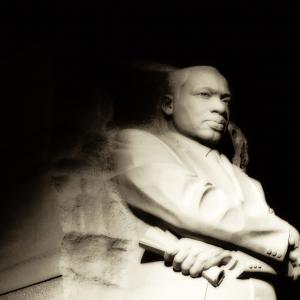
Image via Johnny Silvercloud/Flickr
The 2016 U.S. presidential campaign, election, and aftermath provide some data with which to diagnose how America is measuring up — not only to her to her founding principles but, for American Christians, to our confession of Christ and the laws of God.
Welcome to the Resistance. Here's Your Survival Guide.
All great resistance communities practice a two-pronged approach. Mohandas Gandhi described this as an “obstructive program” alongside long-term “constructive engagement.” Both are needed for the wheel of resistance to turn.
A Prayer for Haiti
As for us, Lord, we who are far away from the rubble and the flood,
from the sobbing and moans, but who hold them close in our hearts,
imbue us with the strength of Simon the Cyrene.
Mary Cosby, Cofounder of the Landmark Church of the Saviour, Dies at 93
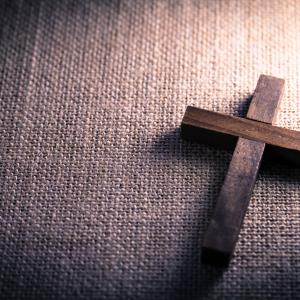
Image via enterlinedesign / Shutterstock.com
Mary Campbell Cosby, cofounder of the Church of the Saviour movement she launched with her husband and partner Rev. N. Gordon Cosby in the 1940s, died this week in Washington, D.C. She was 93 years old.
News of her passing spread quickly on July 3. Kayla McClurg sent an email to family and friends saying, “I am writing to let you know that our dear Mary Cosby passed away very gently and suddenly this afternoon at Christ House.”
Making the Crooked Way Straight
Dan Berrigan spent a lifetime standing against the hubris of policymakers - and religious leaders - who had lost their way.
On April 30, 2016, Catholic peacemaker and activist Daniel Berrigan entered life eternal. He was a teacher and friend to many in the Sojourners community. Read more reflections on Dan's life and legacy in the August 2016 issue.
"VIOLENCE ONLY EXISTS with the help of the lie!”
With these words Father Daniel Berrigan and I sealed our fate. It was summer 1995. August 6. We’d been invited to read at the Washington National Cathedral’s service commemorating the 50th year since the U.S. used atomic weapons on civilians in Japan.
The cathedral was full. I was supposed to read an adaptation from Thomas Merton’s scathing indictment of U.S. militarism, the poem “Original Child Bomb.” Dan was slated to read from Soviet-resister Aleksandr Solzhenitsyn’s Nobel Prize lecture and from Maximilian Kolbe, the Polish priest who exchanged his life for a fellow prisoner in Auschwitz.
Minutes before the liturgy began, a member of the cathedral staff told us there was a change in the readings. Thomas Merton was too controversial; I should read from Deuteronomy. Dan should also read from scripture instead of from Solzhenitsyn and Kolbe.
Should I Care More When a Christian is Killed?
Religion is rarely the only issue involved in persecution.
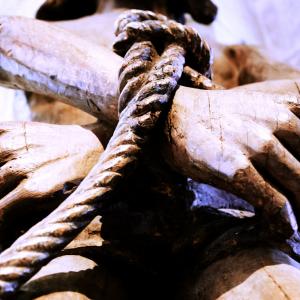
Elena Dijour / Shutterstock
THE BASILICA OF St. Bartholomew on the Island in Rome holds the bones of the apostle St. Bartholomew, who delivered the gospel of Matthew to India, southern Arabia, and Syria. Spreading the seditious good news eventually got him killed—crucified upside down in Baku, capital of modern Azerbaijan. Bartholomew proclaimed the resurrection of Jesus until the soldiers cut off his head.
In 1999, this church nestled on an island in the Tiber River was dedicated to modern Christian martyrs. Entering its cool interior, one can walk a global Via Dolorosa—each side altar is dedicated to parts of the world where Protestants, Catholics, and Orthodox have been killed for their faith.
The relics include a letter from Franz Jägerstätter, the Austrian farmer beheaded for refusing to serve in Hitler’s army, and the missal of Salvadoran Archbishop Óscar Romero left on the altar when he was assassinated during Mass in 1980.
Christians today fall out over Christian martyrs and persecution in a right/left divide. We fight about numbers. In 2015, Christian Freedom International released an often repeated statistic suggesting that Christians are “martyred for their faith every five minutes.” This has been widely debunked. But it raises questions about definitions, methodologies, and theological perspectives.
Thomas Schirrmacher directs the International Institute for Religious Freedom, which runs a research project with several universities to measure Christian persecution. He estimates that there are 7,000 to 8,000 Christian martyrs each year, a number that roughly matches the Open Doors World Watch List, which reported 7,106 Christians killed in 2015, an increase over previous years and far less than one Christian every five minutes.
The Catholicism That Made Pope Francis Possible
In 1963, this was the Catholicism I was baptized into: courageous, resistant, self-sacrificing, street-oriented, thoroughly immersed in the living public liturgy grounded in the experiences of those who suffer—especially those who suffer by the design of others. This is the 20th century Catholicism of Dorothy Day and Peter Maurin, Thomas Merton, Cesar Chavez and Dolores Huerta, the Berrigans, Elizabeth McAlister, Antona Ebo, and many others. This is the Catholicism that helped make a person like Pope Francis possible.
Congolese Priest Fighting Coltan Mining Assassinated
Father Vincent Machozi, an Assumptionist Catholic priest who led the fight against the extractive industries and in support of human rights in the Democratic Republic of Congo, was assassinated on Sunday night, March 20, when members of Congolese military disrupted a peacemaking retreat at a village in Beni and murdered him in a hail of bullets. According to reports, onlookers said Fr. Machozi’s last words were: “Why are you killing me?”
Remembering Scenes from a Massacre as 'Butcher of Bosnia' Convicted of Genocide
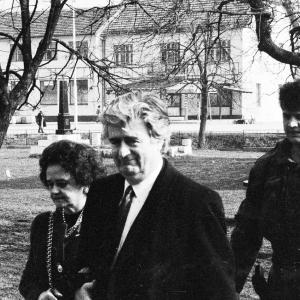
Bosnian Serb leader Radovan Karadzic, his wife and bodyguard attend church services in Pale, Bosnia in 1993. Northfoto / Shutterstock.com
As I watched the presiding Judge O-Gon Kwon read the verdict — for a full 58 minutes — it all came back to me. In 1996 and in 1999, I traveled in and out of the war zones in Bosnia. The hand-dug graves in the soccer field. The reports of Muslim massacres; of whole villages forced into a school gym and burned alive; the small hotel where we stayed that was also housing skeletal refugees recently released from a Serb concentration camp; the dogs with blown-off paws; the underground bakery distributing bread at the risk of their lives. And most of all “Sniper Alley” in downtown Sarajevo and the Serb soldier who showed me his sniper nest on Serb-held Mt. Jajolina and pointed his rifle at the place where I was staying.
From the Archives: May 2004
Preferential Option for the Poor

NATALIA61 / Shutterstock
IN 1968, the [Latin American Catholic] bishops met in Medellín, Colombia, to examine the church’s role in social and political transformation in Latin America. Here the vision of a “preferential option for the poor,” which had been rising up from the base for several years, was first clarified.
“The Lord’s distinct commandment to evangelize the poor,” wrote the bishops at Medellín, “ought to bring us to a distribution of resources and apostolic personnel that effectively gives preference to the poorest and most needy sectors.”
Afraid and Reaching for a Gun
Fear is a spiritual issue, not a political one.
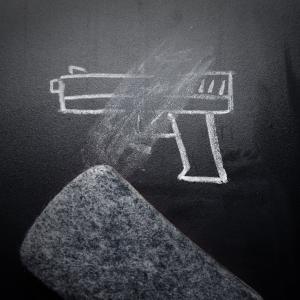
gangis khan / Shutterstock
AFTER MASS a few months ago, I asked a member of my parish how her search for a new apartment was going. She said, “I’m so scared where I’m living right now that I went out and bought a gun.”
I was shocked. “I hope you didn’t buy any bullets to go with it,” I quipped. She gave me an eye-roll; I gave her a hug.
Like many Americans (dare I say most)—from President Obama on over—I despair of our country ever regaining sensible gun-ownership standards.
If I had my way, society would have no guns. Period. My motto is: The only way to stop a bad guy with a gun is ... the unarmed cross of Jesus Christ.
However, I recognize that in rural areas a gun can be a tool for wildlife maintenance.
I recognize that a well-ordered society relegates certain uses of force to the state—generally understood as police and military—for the protection of its members, especially the vulnerable.
I recognize that the U.S. Constitution has a Second Amendment—controversial as it may be—that allows for people to “keep and bear arms” (in the context of a “well-regulated militia” that was deemed “necessary to the security of a free state”). It’s a system of checks and balances built into our democracy’s operating manual.
(Almost) Everything I Know About Hell I Learned From 'Buffy'
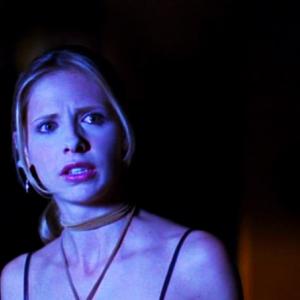
Image via amy/Flickr
For 700 years, Dante's epic poem — mainly the "Inferno" — has been the source of inspiration for preachers, pastors, and not a few theologians, who promoted hell as a physical place with its own address, zip code, and smoking embers. Add to their oratorical brimstone the fiery images from artists — Gustave Doré, Hieronymous Bosch, or Buffy producer Joss Whedon — and you've got a potent pedagogy.
The Language of Angels
Heaney understood words as "bearers of history and mystery."

Mikhail Zihranichny / Shutterstock
SHORTLY BEFORE Irish poet Seamus Heaney died in 2013, he texted these last words to his wife, Marie: Noli timere. Be not afraid.
I’m not sure if Heaney, who was described by Robert Lowell as “the most important Irish poet since Yeats,” knew this was his last text and final words, but I suspect he did.
It’s a sad commentary that when the Twitterverse got hold of Heaney’s message, no one could figure out what it meant or where it was from. Many did not recognize the angels’ message to Zechariah (Luke 1:13) or Mary (Luke 1:30) or the shepherds (Luke 2:10) or Joseph in a dream (Matthew 1:20): Be not afraid.
Heaney understood words as “bearers of history and mystery.” As a distinguished translator of poetry from Greek, Latin, Italian, Irish, Anglo-Saxon, and Middle Scots, he had plenty of languages to choose from. But he chose St. Jerome’s fourth century vulgate version of the Bible. He chose the language of the angels.
The No KXL Miracle
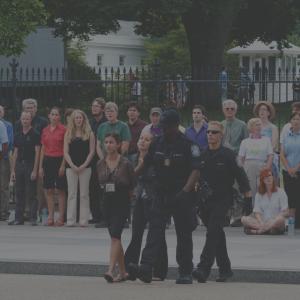
Image via Rena Schild/Shutterstock.com
They said it was a fool’s errand.
They said there was too much money on the other side.
They said the politics were too difficult.
And yet here we are.
As my friend Bill McKibben wrote in 2011, our indigenous brothers and sisters in Canada had been fighting the Keystone XL pipeline for years. But before August 2011, virtually no one in the U.S. had even heard of it.
Then I read the pastoral letter from Alberta’s Bishop Luc Bouchard, The Integrity of Creation and the Athabasca Oil Sands, and I felt the Spirit calling me to action.
We put out a call to religious leaders to join the Tar Sands Blockade in Washington, D.C., in the summer of 2011. It was hot. It was humid. It was summer in D.C. But hundreds and hundreds of Protestant pastors, rabbis, Buddhist priests, Franciscans, Unitarians, and Christians of all stripes said they would come.
What Pope Francis Can Teach the U.S. Catholic Church about Thomas Merton
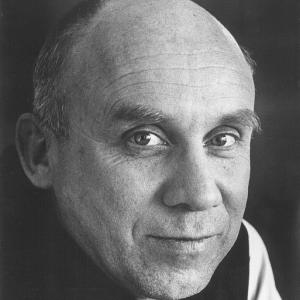
Thomas Merton portrait by John Howard Griffin. Photo via Jim Forest / Flickr / RNS
At his speech before Congress on Sept. 24, Pope Francis listed Trappist monk Thomas Merton as one of four exemplary Americans who provide wisdom for us today.
Out on the National Mall, thousands cheered when the pope named two other exemplary Americans: Abraham Lincoln and Martin Luther King Jr. Fewer recognized Merton (or the fourth exemplar the pope mentioned, social activist Dorothy Day.)
The pope did not choose to hail anyone associated with the institutional Catholic Church as his models. Instead he chose a former president, a Protestant minister, a lay Catholic, and a monk.
The Front Lines of the Global Free-Trade War
Why one pastor from West Papua is traveling around the world - and asking for help.

Shutterstock / Julia Tsokur
ONE GAUGE OF global policies is how they affect people we may have never heard of. West Papuans, for example.
In March, I met Matheus Adadikam while he was visiting Washington, D.C. He’s the general secretary of the Evangelical Christian Church in Tanah Papua, representing 600,000 people. Located between Australia and Indonesia, West Papua shares a South Pacific island with New Guinea. It’s basically on the other side of the world from D.C.
Pastor Matheus told me about his country. Well, not exactly his country, he says. Indigenous Papuans have lived there for 40,000 years, but in the colonial era—and more recently, as a province of Indonesia—they’ve had no right of self-determination. “As a Papuan, we have no right to speak about our rights as Papuans,” he says. “Forty years ago we ‘became Indonesian,’ so we can no longer speak of ‘Papuan human rights.’”
The story is starkly familiar. Since the establishment of colonial economic forces, the land of Indigenous Papuans has been held in chattel slavery by those more powerful—English (1793), Dutch (1828), Japanese (1944), United Nations (1962), and now Indonesians (1963). “Killings, torture, and rape of Indigenous people are routine,” according to the Center for World Indigenous Studies. A conservative estimate is that 100,000 people have been killed since 1963. “Even to raise our Morning Star flag is to die or be in jail,” says Matheus. (One man is serving seven years in jail for flag-raising.)
In 1960, a rich vein of gold and copper was discovered in the Jayawijaya mountain range in West Papua. After some back-room deals, the U.N. “gave” West Papua to Indonesia. Indonesia promptly welcomed the Phoenix-based Freeport-McMoRan mining company to open what became the largest gold and third-largest copper mines in the world.
“Justice, peace, and care of all of the Lord’s creation is the main mission of our church,” says Matheus, “but our experience has been that change happens fast, and external influences are changing who we are as a people.” His main mission now is traveling the world asking for help.
On Rabbits and the Pill
The official Catholic teaching on contraception hasn't changed -- but lay Catholics worldwide follow their own moral reasoning

trefalga / Shutterstock
EARLIER THIS YEAR Pope Francis titillated the world’s 1.2 billion Roman Catholics when he said we should not feel compelled to breed “like rabbits.” The Twitterverse resounded with commands to “hop to it.” The Italian press dubbed Francis’ speech the “Sermon of the Rabbit.”
In it, Pope Francis said, “Some think that—excuse the language—that in order to be good Catholics, we have to be like rabbits. No. Responsible parenthood.”
Was the pope changing Catholic teaching on birth control? On the contrary, Francis went on to underscore that “responsible parenthood” requires that couples regulate the births of their children, as Vatican teaching allows, using natural family planning methods.
What we think of as “the Catholic position” on contraception—“‘Every action which ... proposes to render procreation impossible’ is intrinsically evil”—was actually codified as official teaching in 1930 under Pope Pius XI and was part of a larger conversation in Christendom. At the 1930 Lambeth Conference, for example, the Anglican bishops approved a resolution stating: “In those cases where there is such a clearly felt moral obligation to limit or avoid parenthood, and where there is a morally sound reason for avoiding complete abstinence, other methods [of contraception] may be used, provided that this is done in the light of the same Christian principles.”
In 1951, Pope Pius XII overtly accepted natural family planning as a moral form of regulating births, in limited circumstances, within Christian marriage. He also emphasized the importance of a mature and informed conscience in moral reasoning. “It is correctly argued,” he wrote, “that the true meaning of adult independence is not to be led like a little child.”
As part of the process around the Second Vatican Council, Pope Paul VI oversaw a commission to examine the use of oral contraceptives in light of church teaching. The commission’s report—titled “Responsible Parenthood”—argued for the use of artificial contraception within Christian marriage. In the end, Pope Paul VI rejected the commission’s recommendation, and his 1968 encyclical Humanae Vitae reaffirmed the church’s teaching against artificial contraception.
A Prescription for the Earth
Pope Francis, the world's spiritual physician, has diagnosed us with a degenerative disease.
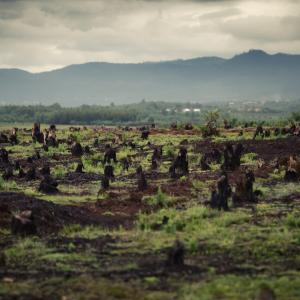
Dudarev Mikhail / Shutterstock
AS THE FATE of the world hangs in the balance, one humble pastor—leader of the world’s smallest nation-state—offers a word. Well, closer to 40,000 words.
Pope Francis’ much awaited social teaching on ecology was released in June to global acclaim and thunderous Twitterapplause. Laudato Si’ (“Praised Be to You”) takes its name from a line in St. Francis of Assisi’s “The Canticle of the Creatures,” written in 1225. The encyclical lays out the house rules for this earthly commons we share—archaea, bacteria, and eukaryota alike. (Google it. You, me, all the fauna and flora, are part of eukaryota.) So, what do you need to know?
1. The news is not good. The world’s leading spiritual physician has diagnosed “every person living on this planet” with a progressive and degenerative disease. A soul sickness has spread through us to infect the soil, seas, skies, and even the seasons. Among humans, the poorest have the least resistance and the richest are the major vectors. This disease multiplies in isolation and loneliness, with symptoms of obsessive consumption, greed and corruption, and habitual narcissism. “The external deserts in the world are growing, because the internal deserts have become so vast.”
2. This disease is having dire consequences: objectification of the other, a failure of awe in the presence of beauty, and a defiance of reality by those who claim the “invisible forces of the market will regulate the economy” and dismiss the impact on society and nature as “collateral damage.”
This Independence Day, Read Bree Newsome’s Call to Courage

Image via NatBasil/Shutterstock
If we want our churches to once again become places where young freedom fighters come to be strengthened, trained, and act in the peace of Christ for the spread of the good news of Jesus, then I recommend we start this Sunday — when as a country, we celebrate what it means to live free from fear.
'The Violence Comes and Goes but ... the Victory Is Already Won'
Last night nine Christians were massacred while at Bible study at Emanuel AME Church in Charleston, S.C. The dead include state Sen. Rev. Clementa Pinckney, senior pastor and state senator, and his sister.
The suspect, Dylann Roof, is 21 years old. He sat for an hour with the pastor and others gathered for Wednesday night Bible study, then open fired. Reportedly, he reloaded as many as five times while church members tried to talk him down. He said he "had to do it." This was a racialized hate crime.

